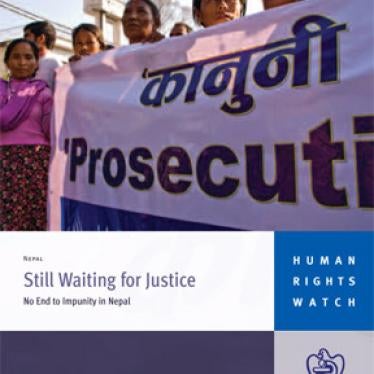The decade-long conflict in Nepal was riddled with egregious violations of human rights law and the laws of war on both sides. When the war ended in 2006, victims were suddenly hopeful that the promise of accountability embedded in the Comprehensive Peace Agreement would lead to justice.
But five years on, that justice is yet to materialise. And ominously, the new Prime Minister, backed by his Attorney General, has made clear that war time cases will be withdrawn and a blanket amnesty granted to the accused, indicating that justice will be sacrificed at the altar of political expediency.
Such cases include the now emblematic case of Maina Sunuwar, a 15-year-old schoolgirl, who was taken into military custody in February 2004 and then “disappeared.” Her remains were eventually recovered in 2007 from the Panchkal army camp, where she had been tortured, killed and buried. Charges have been filed against four army officers in a civilian court, but none have been arrested and they continue to enjoy army protection.
Another emblematic case is Arjun Bahadur Lama, who was abducted by members of the Maoist insurgency as he was celebrating his election to a school management committee in April 2005. Witnesses saw him paraded through several villages before he vanished. An investigation by the National Human Rights Commission eventually concluded that he had been killed by his captors. Those considered responsible for his abduction and disappearance are known and named but have never been arrested.
After the peace agreement, both the Sunuwar and Lama families had hoped that there would be justice. Instead of justice, what has transpired is obstinance and denial from the army, empty rhetoric from the Maoists, and unsavoury political bickering among the other parties in the country’s Constituent Assembly. The political parties, including the Maoists, have repeatedly stated their commitment to accountability for war-time crimes. Yet since the end of the conflict no one has been tried for extremely serious abuses.
Impunity has become the face of the new Nepal.
With the election of Baburam Bhattarai of the United Communist Party of Nepal (Maoist) (UCPN-M), Nepal now has its fourth prime minister since the Constituent Assembly elections in April 2008. While there are hopes in some quarters that a strong and stable government could address justice, the Bhattarai government has already made a disastrous start. The four-point agreement between the UCPN-M and their coalition partner calls for the withdrawal of criminal cases against individuals affiliated to the two groups, and declares a general amnesty which could include serious crimes and human rights abuses. After being called to task publicly on this pledge, Bhattarai clarified that he would withdraw only “politically motivated” cases but remained silent on who would determine what constitutes such a case. Disturbingly, the Attorney General, meant to be an independent and apolitical safeguard of rights, has suggested that he would be in favour of such withdrawals. While the army is not a party to this agreement, an amnesty and whitewash of the thousands of killings and disappearances is perhaps the one thing that it and the Maoists can agree on.
An amnesty will be dressed up as necessary for national reconciliation and to break the logjam over the drafting of a new constitution, which is the primary purpose of the Constituent Assembly. But the failure to draft a new constitution has not been about accountability, it has been about federalism and minority rights.
Indeed, in Nepal there is strong support in civil society for an accounting for the disappeared and justice for victims and survivors. Nepalis have been extremely vocal about accountability, which explains why Bhattarai rowed back. The challenge now is to make sure that the Maoists, other political parties and the army do not resurrect this idea and make a deal, however informal, to bury the past. Such a proposal is not only unacceptable under international law and various rulings by the Supreme Court of Nepal, but it would dramatically undermine public confidence in democracy.
Bhattarai’s Maoist party has made strong commitments on human rights since it joined mainstream politics following the peace agreement. The party, when initially in power, committed itself to acceding to the Rome Statute but has been woefully silent on this front since entering the world of real politics. Nepal’s international friends and donors, including India, should not accept a new chapter in Nepal’s history to be based upon a culture of impunity, particularly in light of a world enabled, through the mechanism of the Rome Statue, to ensure justice to victims of war. Justice still evades not only the families of Maina Sunuwar and Arjun Bahadur Lama, but thousands of others who were tortured, killed or disappeared between 1996 and 2006. Bhattarai has many tasks ahead of him in the three months which remain in the tenure of the Constituent Assembly. He should not allow himself to be remembered as a leader who, once in power and as one of his first acts, denied justice to the very people for whom he and his party claimed to have taken up arms.
Brad Adams is the Asia Director at Human Rights Watch







